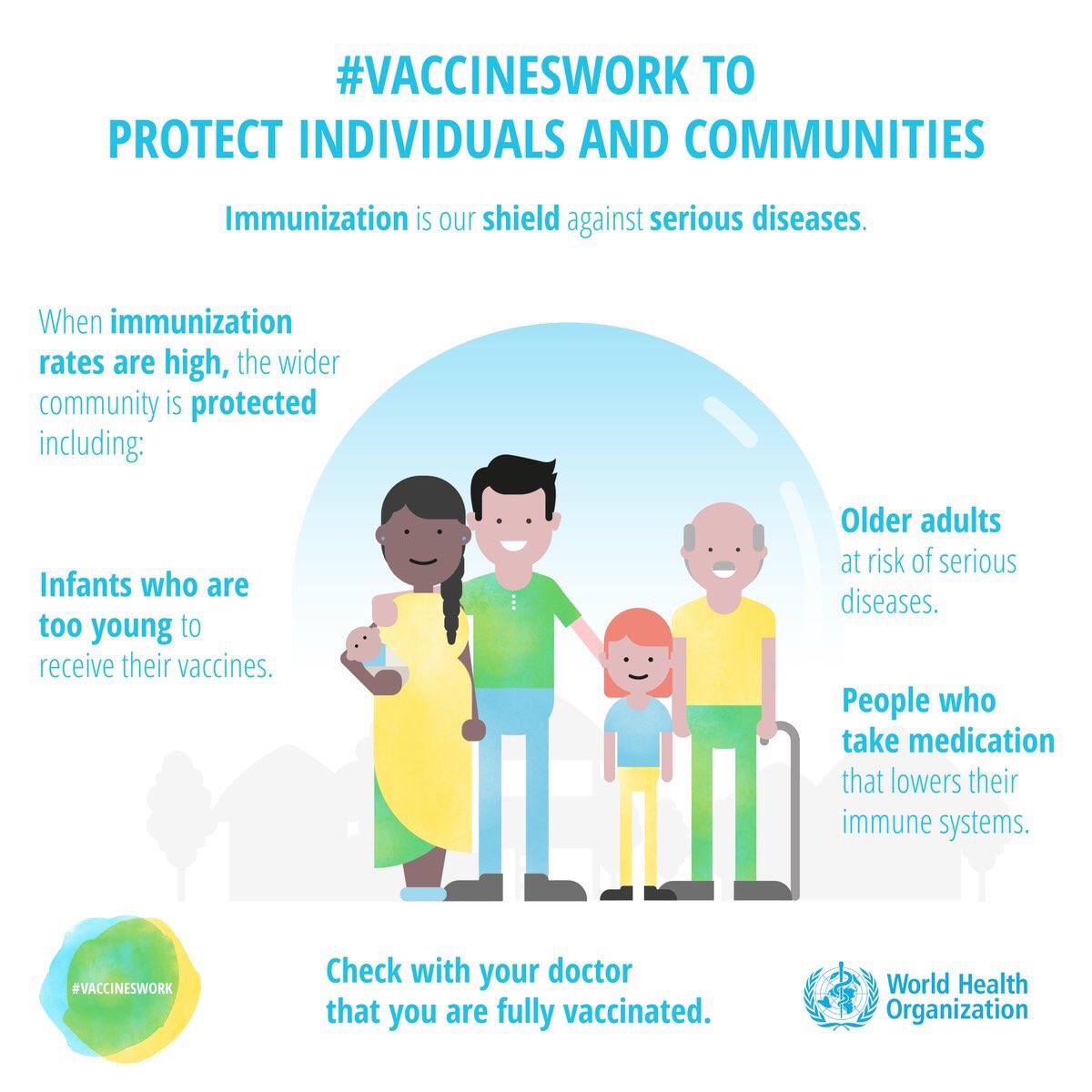
Overview
Vaccination is one of the best ways to prevent diseases. In total, vaccines are estimated to save between 2 and 3 million lives every year.
Together with governments, vaccines manufacturers, scientists and medical experts, WHO's vaccine safety programme is constantly helping monitor the safety of vaccines.
This helps ensure that vaccines are safe for you and your family.
How do we know that a vaccine is safe?
The most commonly used vaccines we have today have been in use for decades, with millions of people receiving them safely every year.
In addition, there are several new vaccines under development. If approved, these will help prevent more life-threatening diseases – such as Zika or Nipah viruses - or improve the effectiveness of existing vaccines.
As with all medicines, every vaccine needs to go through extensive and rigorous testing before it can be introduced in a country. Once they are in use, they must be continuously monitored to make sure they are safe for the people who receive them.
Are there side effects from vaccines?
Vaccines are very safe. As with all medicines, side effects can occur after getting a vaccine. However, these are usually very minor and of short duration, such as a sore arm or a mild fever. More serious side effects are possible, but extremely rare.
A person is far more likely to be seriously harmed by a disease than by a vaccine. Vaccine-preventable diseases like measles, meningitis or polio can be deadly, or cause severe illness and disability. Possible complications of these diseases can include:
Blindness;
Deafness;
Paralysis;
Brain damage;
Infertility;
Cancer;
Birth defects;
Death.
How are vaccines tested?
Once a promising vaccine is identified, it will firstly undergo scrupulous laboratory testing. This includes careful examination and testing of the vaccine and its ingredients. These tests evaluate the safety of the vaccine, and how well it prevents a disease.
If positive results are achieved in the lab, a manufacturer can then apply to do clinical trials. These trials typically involve several thousand healthy volunteers participants on a voluntary basis, whose safety is ensured by national regulatory authorities. The trials are bound by strict regulations and take place across three main phases:
During Phase I, small groups (for instance, approximately 20-50 people) receive the vaccine. This phase will assess the safety, side effects, appropriate dosage, method of administration and composition of the vaccine.
If it is successful, it will proceed to Phase II. At this stage, the vaccine is usually given to several hundred people. This group will have the same characteristics (e.g. age, sex) as the people for whom the vaccine is intended to be given.
In Phase III, the vaccine is usually given to thousands of people to help ensure it is safe and effective for broader use.
The results of all these studies will be assessed when regulators decide whether to approve a vaccine.
Studies may also take place after a vaccine is introduced. They enable scientists to monitor efficacy and safety among an even larger number of people, over a longer timeframe.
Who approves a vaccine?
In countries where vaccines are manufactured, national or regional regulators oversee a vaccine’s development. This includes approving clinical trials, evaluating their results, and taking decisions on licensing. In deciding, regulators must refer to very strict international standards on acceptable ethical clinical practice.
Once a vaccine has been developed, national regulators decide whether to introduce a vaccine in their countries. WHO provides information to support this process, through comprehensive evaluation of the available evidence, and its regularly updated position papers on vaccines.
How is vaccine safety monitored?
As with all medicines, the safety of a vaccine must be continuously monitored, even after trials and vaccine introduction.
This monitoring considers reports from several sources. Nationally, these include the people who get vaccines, parents or caregivers, and health workers. These reports are then submitted to national health authorities.
At a regional and global level, WHO and UNICEF support countries in collecting and monitoring this information, and ensuring countries have the most up to date evidence on available vaccines.
What happens if a problem is suspected with a vaccine?
If a potential problem is reported following vaccination, a thorough investigation will take place. Investigations involve a thorough examination of the case in question, including medical assessment. If necessary, detailed studies are conducted.
During these investigations, it is extremely rare that health problems are found to be caused by the vaccine itself.
Health events are most often found to be coincidental, i.e. entirely unrelated to vaccination.
Sometimes, they are related to how the vaccine has been stored, transported or administered (for instance, where errors are made in preparing the vaccine). Such errors can be prevented by training health workers, and strengthening vaccination programmes.
In the rare cases where a genuine adverse reaction is suspected, the vaccine may be suspended from use. Further investigations will take place to determine what exactly caused the event, and corrective measures put in place.
How does WHO help ensure vaccine safety?
WHO works to make sure that everyone, everywhere is protected by safe and effective vaccines. To do this, we help countries set up rigorous safety systems for vaccines – alongside other medicines - and work to develop the strictest standards for their regulation.
Together with external scientists, WHO experts are continuously monitoring and updating the safety profile of more than 20 vaccines. With external partners, it also helps countries investigate and communicate if potential issues of concern arise.
Events that are reported to WHO are evaluated by an independent group of experts (the Global Advisory Committee on Vaccine Safety, or GACVS). On behalf of this committee, WHO issues regular statements on vaccine safety.
https://www.who.int/news-room/questions-and-answers/item/vaccines-and-immunization-vaccine-safety